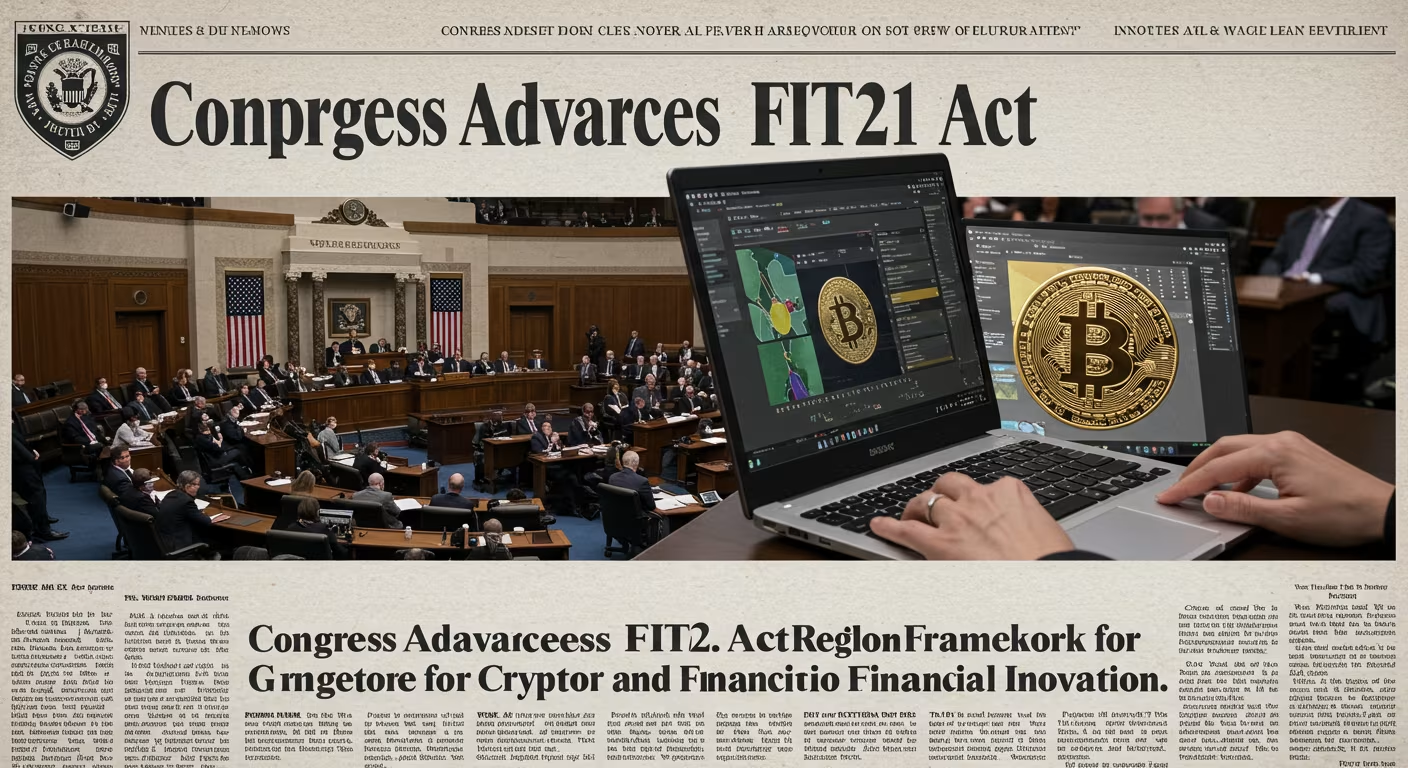In a landmark move signaling bipartisan momentum toward regulating the digital asset economy, the U.S. Congress has advanced the Financial Innovation and Technology for the 21st Century Act (FIT21)—a comprehensive legislative proposal aimed at establishing clear rules for cryptocurrency markets, digital asset issuers, and blockchain-based platforms.
The FIT21 Act, one of the most significant pieces of crypto-focused legislation to gain traction on Capitol Hill, promises to bring long-awaited regulatory clarity to a rapidly evolving sector. The bill defines how digital assets should be classified, outlines responsibilities for the Securities and Exchange Commission (SEC) and Commodity Futures Trading Commission (CFTC), and lays the groundwork for responsible innovation in the fintech space.
As digital assets grow more integral to the financial system—from stablecoins and decentralized finance (DeFi) to tokenized securities and blockchain payments—Congress is stepping up with a framework designed to balance consumer protection, innovation, and market integrity.
Here’s what the FIT21 Act proposes, why it matters, and what it could mean for crypto firms, investors, and the broader financial landscape.
What Is the FIT21 Act?
The FIT21 Act is a bipartisan legislative proposal designed to address regulatory uncertainty surrounding digital assets and to foster innovation while establishing consumer safeguards. It aims to create a functional, risk-based framework for regulating cryptocurrencies, crypto trading platforms, digital asset intermediaries, and token issuers.
Key goals of the bill include:
- Defining clear jurisdictional boundaries between the SEC and CFTC
- Creating a formal registration process for digital asset intermediaries
- Establishing disclosure standards for token offerings and developers
- Providing safe harbor provisions for early-stage innovation
- Requiring stablecoin transparency and reserve disclosures
- Mandating cybersecurity, AML, and consumer protection protocols
FIT21 was developed in response to years of confusion over whether cryptocurrencies should be classified as securities, commodities, or something entirely new. It seeks to end this ambiguity by offering a unified framework for federal oversight.
SEC vs. CFTC: Dividing Regulatory Turf
One of the most notable features of the FIT21 Act is how it delineates responsibilities between the SEC and CFTC, the two primary agencies that have previously clashed over digital asset regulation.
- The SEC will retain authority over digital assets that qualify as securities, including certain tokens issued as part of investment contracts.
- The CFTC will oversee digital commodities, which include most crypto tokens like Bitcoin, Ethereum, and other decentralized assets that meet specific decentralization criteria.
This division is significant because it provides regulatory certainty for crypto developers, exchanges, and investors, who have long complained of inconsistent enforcement actions and conflicting guidance.
To support implementation, the bill also calls for joint rulemaking and interagency coordination, ensuring that both agencies work together to address emerging risks and evolving technologies.
Digital Asset Issuers: New Responsibilities, Clearer Rules
The FIT21 Act introduces a registration process for token issuers, requiring them to disclose relevant information about their projects, including:
- Tokenomics and supply mechanics
- Code audits and security measures
- Team background and token distribution
- Use of proceeds and investor protections
Issuers will be required to file initial disclosures and ongoing updates, similar to traditional securities offerings, unless they qualify as fully decentralized under the bill’s defined criteria.
This structure is designed to ensure transparency and accountability without stifling innovation. Early-stage projects that meet certain thresholds may benefit from a safe harbor period, allowing them to build without the immediate burden of full compliance.
Rules for Digital Asset Intermediaries and Exchanges
Crypto exchanges, wallet providers, custodians, and other intermediaries will face mandatory registration with federal regulators under FIT21. These platforms must implement:
- Anti-money laundering (AML) and know-your-customer (KYC) procedures
- Operational risk and cybersecurity controls
- Fair access and trading transparency mechanisms
- Consumer redress systems in the event of fraud or technical failure
By aligning crypto exchanges with existing financial market infrastructure standards, the legislation aims to boost investor confidence and reduce the risk of catastrophic failures like FTX or Celsius.
Support and Criticism
The FIT21 Act has garnered broad support from industry leaders, bipartisan lawmakers, and fintech innovators who see it as a turning point for responsible digital asset regulation.
Supporters argue the bill:
- Creates a clear path for legal compliance
- Supports market growth and innovation in the U.S.
- Brings transparency and consumer protection
- Reduces the risk of regulatory overreach or arbitrary enforcement
However, some critics—particularly from more progressive or anti-crypto factions—warn that the bill:
- May limit the SEC’s authority over certain tokens
- Doesn’t go far enough to address environmental or financial stability risks
- Could be exploited by bad actors without aggressive enforcement mechanisms
Still, most stakeholders agree that the status quo—defined by regulatory uncertainty and legal battles—is unsustainable. FIT21 is seen as a meaningful first step toward maturing the crypto sector under the rule of law.
Impact on the Crypto Industry
If enacted, the FIT21 Act would have a profound impact on the digital asset ecosystem:
- Startups and token developers would gain a roadmap for legal fundraising and distribution, reducing the fear of SEC enforcement.
- Investors would benefit from increased transparency, security, and market oversight, improving trust in digital asset platforms.
- Stablecoin issuers would face new rules on reserve requirements, audits, and real-time disclosures, addressing systemic risk.
- Decentralized platforms (DeFi) could receive tailored exemptions or modified obligations depending on their governance and structure.
- Financial institutions would be more likely to enter the crypto space, confident in regulatory compliance and legal clarity.
In short, FIT21 has the potential to legitimize and institutionalize crypto markets in the U.S., encouraging both innovation and responsibility.
What’s Next for FIT21?
With the bill now advancing through committee hearings, its sponsors are optimistic about gaining bipartisan support in both chambers. If it passes Congress and is signed into law, FIT21 would mark the most comprehensive piece of crypto legislation in U.S. history.
The coming months will involve negotiations over specific definitions, agency roles, and enforcement provisions. But even at this stage, the bill represents a watershed moment in the regulatory evolution of financial innovation.
Toward a Balanced Future for Crypto and Finance
The FIT21 Act is a reflection of a broader shift—where policymakers recognize that crypto and blockchain technologies are not fringe experiments, but central components of tomorrow’s financial infrastructure. By advancing this bill, Congress is signaling that innovation and oversight can coexist, paving the way for a safer, smarter, and more inclusive digital economy.
As the world watches how the U.S. approaches crypto regulation, FIT21 could set the tone for international standards, institutional adoption, and long-term growth in the blockchain space.





